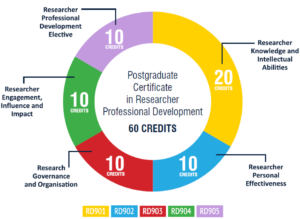SUPER Postgraduate Certificate in Researcher Professional Development (PG Cert)
All SUPER PGRs will register for the PG Cert, which is designed to enhance professional and personal development through a bespoke training programme that supports individual research, career and personal goals.
The SUPER PG Cert programme enables PGRs to reflect on the development of their skills and to understand where their development needs lie so that learning can be focused at each stage of their studentships.
The PG Cert qualification, administered and ratified by the University of Strathclyde, helps to formalise all the activities undertaken as a postgraduate researcher and to support growth into a highly skilled researcher, in high demand from a variety of employers.
On completion of their PhD and PG Cert, our students will have acquired expertise, skills and knowledge in their specialist discipline and also a broad and deep transferrable skill set.
Further information for SUPER PGRs and their supervisors on the PG Cert can be found below:

How to register for the PG Cert
The following registration steps are outlined in full in the PG Cert RPD applicant guide.
Step 1: Use the application link emailed to you to set up an ‘applicant account’ with the University of Strathclyde.
Step 2: Use the login details emailed to you to complete an application for the PG Cert RPD (external) course.
Step 3: Accept the offer emailed to you for a place on the PG Cert course.
Step 4: You will receive a final email with login details to register as a student with the University of Strathclyde.
Once registered, you will have access to your student record including contact details via Pegasus, and to your SUPER PG Cert record through MyPlace, Strathclyde’s virtual learning environment.
MyPlace is where you will log learning activities, upload supporting evidence, submit reflective essays, and review your progress. You will also find PG Cert programme information, resources, and FAQs.
All SUPER PGRs will need to re-register with the University of Strathclyde at the start of each academic year by logging into Pegasus and following the prompts provided.
How does the SUPER PG Cert programme work?
The SUPER PG Cert programme will help you to develop a wide range of skills whilst also giving you the freedom to explore professional development in a way that suits you. Acknowledging the variety of places in which learning and development occurs, the PG Cert rewards a wide range of activities, including formal training but also informal and experiential learning.
Through reflective analysis of activities undertaken during the programme, the PG Cert will help you to articulate your competencies and attributes and convey these to others, including prospective employers.
Funding
Credits
To achieve the PG Cert award, you must successfully accrue 60 credits worth of development activities over approximately three years, aiming for around 20 credits per year. One credit is notionally equivalent to 10 hours or one working day of active learning. Activities that can go towards a credit can be formal, such as a training course, or informal, such as reflecting on what you learned during the course and putting newly-learned skills and knowledge into practice.
Classes
The credits you accumulate must cover the five PG Cert classes. The first four classes are aligned to the Vitae Researcher Development Framework specialist skills sets, or domains, whilst the fifth is an elective to allow you to explore any of these areas in more detail:
- RD901: Knowledge and intellectual abilities (20 credits)
- RD902: Personal effectiveness (10 credits)
- RD903: Governance and organisation (10 credits)
- RD904: Engagement, influence and impact (10 credits)
- RD905: Elective (10 credits)

One reflective essay must be successfully submitted for each of the 5 classes in order to complete the SUPER PG Cert.
This presentation by Vici Royle, University of Strathclyde Researcher Development Team, provides an overview of the SUPER PG Cert.
Supervisors can read a dedicated guidance document for them.
Planning your bespoke training programme
Thinking about your development requirements and possible career goals at an early stage of your PhD will enable you to tailor a training package from all the opportunities available to you and select appropriate activities at the optimal time to support your needs.
You should regularly discuss your training and professional development needs with your supervisor(s) and seek their advice and support for learning opportunities. Formal PhD progress meetings and reports should happen at least annually and, as well as discussing your research, this is an opportunity for your supervisor(s) to review your training progress with you. This can help to inform the bespoke programme of development you undertake as part of the PG Cert. If your University has a Personal Development Plan process in place, this can be a really useful tool to help you plan your training.
Training needs analysis
The SUPER PG Cert programme includes a training needs analysis (TNA) tool which you can access from ‘MyPlace’ once you have registered on the PG Cert course. The TNA is designed to help you assess your current skill levels and to identify competencies which you would like to develop.
The TNA is based on the Researcher Development Framework (RDF) developed by Vitae, which sets out the skills, attributes and knowledge needed to be a successful researcher into 4 domains. The first 4 classes of the SUPER PG Cert (RD901-RD904) have been mapped to these RDF domains, with a fifth elective class (RD905) added to provide some additional flexibility.
To assess your development needs using the TNA plotter, use the RDF descriptors on the left hand side of the plotter wheel (along with the RDF guidance) to record your baseline skill levels across each class. Base your levels on a scale relevant to you, for example with level 5 being where you wish to be at the end of your PhD. The resulting white areas on the plotter wheel should help to highlight gaps to focus on for your development planning.
The TNA will not be assessed but you are encouraged to submit it to MyPlace and to use it as part of discussions with your supervisor(s) to help plan your training and development. It is recommended that you continue to evaluate your skills as you progress with your PhD and it can be useful for this purpose to reassess your baseline skills using the TNA plotter each year.
Core and elective learning activities
Acknowledging the variety of places in which learning and development occurs, the PG Cert rewards a wide range of activities, including formal training but also informal and experiential learning.
Core activities for the SUPER PG Cert programme are the MASTS Annual Science Meeting in Autumn and the Annual Student Retreat in Spring. Alongside these core activities, you will undertake a set of elective elements across the 5 PG Cert classes. Any activities that can demonstrate the development of skills or knowledge of benefit to your research or career can be included, such as conferences, training courses, research cruises, collaborative activities with colleagues, teaching, presentations, public engagement activities, and volunteering. You are also encouraged to take on the opportunity of a placement or internship during the course of your studentship.
The SUPER DTP team will alert you to a range of training and development opportunities as they arise, many of which will be posted on the SUPER DTP calendar of activities or external opportunities, but you can also source your own training activities, including through your institution. SUPER students are also eligible to register for relevant online courses offered through the University of Strathclyde and a current listing of available courses can be found within the PG Cert information on the MyPlace home page.
How do I record my progress and how am I assessed?
It is recommended that you keep your own record of learning activities as you complete them, jotting down a brief description of the activity, date, and a note reflecting on skills or knowledge gained. This will help you when you come to submit your activity records and reflective essays and should also help in thinking about skills development going forwards.
To achieve the PG Cert award, you must successfully:
- Record 60 credits worth of development activities, across the 5 PG Cert classes, over approximately three years; aiming for around 20 credits per year. Class RD901 requires 20 credits while classes RD902 to RD905 require 10 credits each.
- Submit one reflective essay for each of the 5 PG Cert classes.
Achieving credits
One credit is notionally equivalent to 10 hours or one working day of active learning. One credit could therefore comprise a 1-day course, or you could combine several similar but smaller learning activities together to make up a minimum of 1 credit, for example health and safety training comprising several individual components such as fire safety, manual handling, and risk assessment forms.
Where an activity is more lengthy or intense (such as a research survey at sea for a couple of weeks or an internship), it is recommended that you pick out aspects of the experience to form individual activities, in line with the development needs you have identified, and these might address different skill sets across more than one PG Cert class.
Logging activities
Once registered for the SUPER PG Cert, you can go to MyPlace to access an activity template for the relevant PG Cert class in order to log and submit completed activities and to upload supporting evidence.
The template asks you to describe the activity undertaken, assign a number of credits, and provide a brief reflection (this could be bullet points) on the outcomes and/or what you gained from the experience. You will also be asked to submit evidence for the activity, for example, if it is a presentation then this could be a copy of your slides. The Strathclyde PG Cert team will review your submissions and, if successful, will record the final allocation of credits in your personal record.
Keep logging activities until you reach the number of credits required for a class.
Writing reflective essays
When you reach the minimum number of credits required for a class, and they have been approved, a link will appear in MyPlace for you to be able to submit a reflective essay. You will need to submit one essay for each of the 5 PG Cert classes.
The essays should bring together all the activities you have experienced within a class, reflecting on them as a whole and thinking about how they have benefited your development as a researcher. Use the essays to explain the skill sets you chose to focus on and how you developed those skills, and to reflect on what you learnt and how you have, or will, apply your skills in practice.
As a rough guide, an essay for class RD901 (comprising 20 credits) is expected to be around 2000 words in length, and essays for classes RD902 to RD905 (comprising 10 credits) is around 1000 words.
There are many possible frameworks for reflective writing. One framework to consider is:
- What did you experience? – a few sentences setting the context by describing what you did, i.e., outlining the set of activities that you have logged.
- Reflect on your experience – why did you choose those activities, what did you want to achieve, and what were your expectations?
- Draw conclusions from your experience – was it a positive experience (and if not, why not), did you achieve what you expected to, how has your experience impacted upon you/your peers/your supervisor, what have you learnt along the way?
- What will you take forward from the experience? – how will you be putting into practice what you have learnt, will you be doing anything differently going forward, what are your next steps?
Another way to think of this reflective process is simply: What? So what? Now what? (the Rolfe reflective model).
The University of Hull’s reflective writing resources are also a useful reference point for guidance on reflective writing.
The University of Strathclyde employs a team of independent markers to review reflective essays and provide feedback at regular points through the year. These review/feedback dates can be found in MyPlace. You may be asked to improve and re-submit an essay but, if this is the case, you will be given constructive feedback. More information on the marking criteria for reflective essays can be found in the University of Strathclyde’s PG Cert (external) Quality Assurance document.
It is recommended that you have all 5 reflective essays submitted at least 6 months before your thesis completion date to give enough time for the essay review cycle and certification, and for you to then focus on finishing your thesis.
SUPER PG Cert support and resources
Support
SUPER PGRs can contact the University of Strathclyde PG Cert team by email at pgcertrpd-external@strath.ac.uk. You can also join a fortnightly lunchtime drop-in session with the Strathclyde team to ask any questions about PG Cert registration, professional development activities, essays, or the ‘MyPlace’ platform. Login to your MyPlace account to see upcoming dates and joining details.
You can also email the SUPER DTP team for general queries at superdtp@st-andrews.ac.uk.
Resources
- University of Strathclyde’s SUPER PG Cert RPD applicant guide.
- Vitae Researcher Development Framework.
- Video: SUPER PG Cert overview.
- Supervisor Guidance document.
- Examples of PG Cert reflective essays.
- University of Strathclyde’s PG Cert (external) Quality Assurance document.
- SUPER Governance and Guidance document.
- SUPER PG Cert handbook.
- SUPER PG Cert applicant guidance.
- Individual Development Plan by Science Careers.
- Training and development opportunities:
